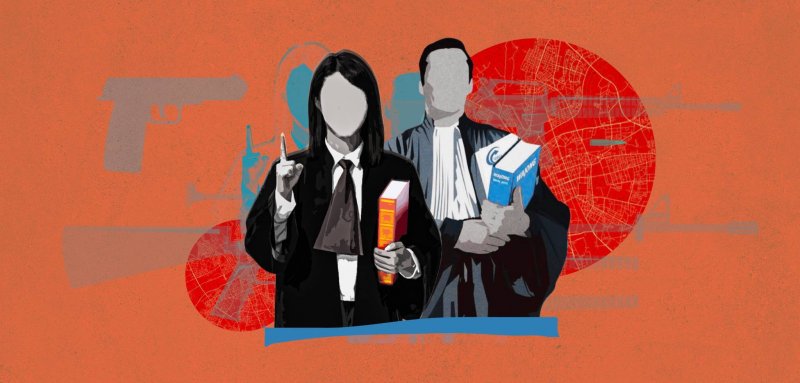Hawraa, a 32-year-old lawyer from Najaf, left the legal profession after practicing for nearly seven years. Her decision came after she was assaulted over a personal status lawsuit she was handling in 2022. Without a job, she turned to the cosmetics industry, which has since become her new source of income.
She regretfully tells Raseef22, "I had ambitions to continue working in the profession I loved since childhood, but the risks surrounding our work, including the threat of death, have become too great. The state and its laws are powerless to protect us."
Due to the widespread security chaos in Iraq and the government's inability to enforce laws, along with the activities of armed groups and the proliferation of weapons outside state control, hundreds of lawyers face threats and extortion on a daily basis. Dozens have been subjected to various assaults, and in 2023 alone, 10 lawyers were killed.
An Iraqi lawyer is assaulted outside his home.
Hawraa graduated from law school in 2015 and trained in civil and personal status cases under a seasoned attorney for about two years before opening a private legal consultancy office with two colleagues.
"I excelled in personal status cases and won many of them in record time, which earned me a good reputation," she says. "But that was before I took on my last case, over a year and a half ago, which led me to leave the legal profession for good."
She recalls the events: "In July 2022, a neighbor contacted me, distressed about her daughter, who was being beaten daily by her husband. She told me she noticed bruises on her daughter every time she visited her at her village home and that her daughter’s husband sometimes beats her with a stick."
Two days after being forced to withdraw her complaint, Hawraa decided to quit practicing law. "I couldn't defend myself, so how could I defend others?" she says bitterly. "I had ambitions to continue working in the profession I love, but the risks surrounding our work, including the threat of death, have become too great. The state and its laws are powerless to protect us."
Hawraa advised the mother to bring her daughter to her and not to let her return to her husband's house. Three days later, the mother brought her daughter to Hawraa's office. The young woman had visible injuries on her face and was clearly in a lot of pain. Hawraa immediately took her to the police station, where she was referred to a hospital for a medical report. It turned out that her arm was also broken.
The following day, Hawraa took the young woman to a notary to arrange for legal representation and filed for divorce on grounds of abuse. She was also preparing other lawsuits related to property and alimony. However, as soon as the husband received notice of the case, he sent his sisters and other female relatives to Hawraa’s office, where they brutally assaulted and beat her.
An hour after she was attacked, a representative of the enraged husband visited Hawraa's parents' home, demanding that her father summon their cousins and the tribal sheikh for a tribal settlement meeting.
Hawraa adds sarcastically, "A complaint was filed against my brother, who helps me in the office, alleging that he attacked the women who assaulted me, despite the fact that he suffers from thalassemia. He weighs no more than 50 kilograms and is only 150 cm tall. How could he possibly have beaten seven village women?"
The complaint Hawraa filed with the police against her attackers led nowhere. The occupants of the offices neighboring hers refused to testify as witnesses, fearing the consequences and potential tribal threats. Even the building owner claimed that the surveillance cameras were not working.
Due to the widespread security chaos in Iraq and the government's inability to enforce laws, along with the activities of armed groups and the proliferation of weapons outside state control, hundreds of lawyers face threats and extortion on a daily basis. Dozens have been subjected to various assaults, and in 2023 alone, 10 lawyers were killed.
"Even worse," she continues, "the client I sympathized with and tried to help accused me of being the one who incited her to defy her husband and file a lawsuit against him. So, everyone turned against me."
The tribal meeting resulted in her father being fined seven million Iraqi dinars (approximately $5,343 USD) and a pledge to force Hawraa to drop the complaints she had filed and refrain from pursuing any legal action against the husband and his female relatives. "My father gave in because they have weapons and influence," she says.
Tribal traditions in conflict resolution
Dozens of lawyers in Iraq complain that tribal and clan traditions have become the most common means of resolving disputes as the state's ability to enforce laws and assert its authority declines. Tribal weapons now dictate outcomes, and customs like tribal settlements and “degga” (or tribal knock)* in tribal councils have the final say.
Two days after withdrawing her complaint, Hawraa decided to quit practicing law. "I couldn't defend myself, so how could I defend others?" she says bitterly. All that remains from her previous legal career is her graduation certificate, still hanging on the wall at home.
The complaint the lawyer filed with the police against her attackers led nowhere. The occupants of the offices neighboring hers refused to testify or stand as witnesses of the assault, fearing the consequences and potential tribal threats. Even the building owner claimed that the surveillance cameras were not working.
Since the US invasion of Iraq in 2003, the country has witnessed severe security deterioration, according to politicians, human rights activists, and civil society members. The activities of armed groups have intensified, and what is officially described as "uncontrolled" weapons have become rampant. This reality threatens the legal profession, exposing many lawyers to the risk of assassination, repeated assaults, and various forms of extortion.
According to representatives from the Iraqi Bar Association, more than 100 lawyers across the country’s governorates have been assaulted, with 10 losing their lives in 2023 alone. The most recent victim was lawyer Adnan al-Nuaimi, who was fatally stabbed in his office in the Dora district of Baghdad in November 2023.
Earlier that year, in April 2023, Baghdad-based lawyer Tahseen al-Kaabi survived an assassination attempt by unidentified gunmen. The attack was linked to a case involving the property of a Christian family for whom al-Kaabi was advocating. He miraculously survived the incident and was hospitalized due to his injuries.
Baghdad-based lawyer Tahseen al-Kaabi lies in a hospital bed following an attack due to a case he was working on.
The Iraqi Bar Association’s statistics only cover reported incidents—whether by security agencies or complaints filed by lawyers themselves. Many cases go undocumented, as lawyers often fear the repercussions of reporting them, according to a source from the Iraqi Bar Association. The source informed Raseef22 that the daily threats lawyers face across the country are intended to pressure them into abandoning their cases.
Attacks on lawyers have fueled increasing calls in recent years to amend Law No. 173 of 1965, which governs the legal profession in Iraq. Lawyers argue that the law needs updating to provide the 84,000 registered lawyers—according to the union’s estimates—with the protection, immunity, and respect they deserve in society.
Proposal to amend the Legal Profession Law
Aws al-Taie, a member of the Iraqi Bar Association’s board, confirms that many lawyers have been attacked and threatened, and some have even lost their lives due to the proliferation of rampant and "uncontrolled” weapons. He points out that the outdated Legal Profession Law no longer meets the needs of today’s lawyers, despite the 14 amendments made to it since its enactment 59 years ago.
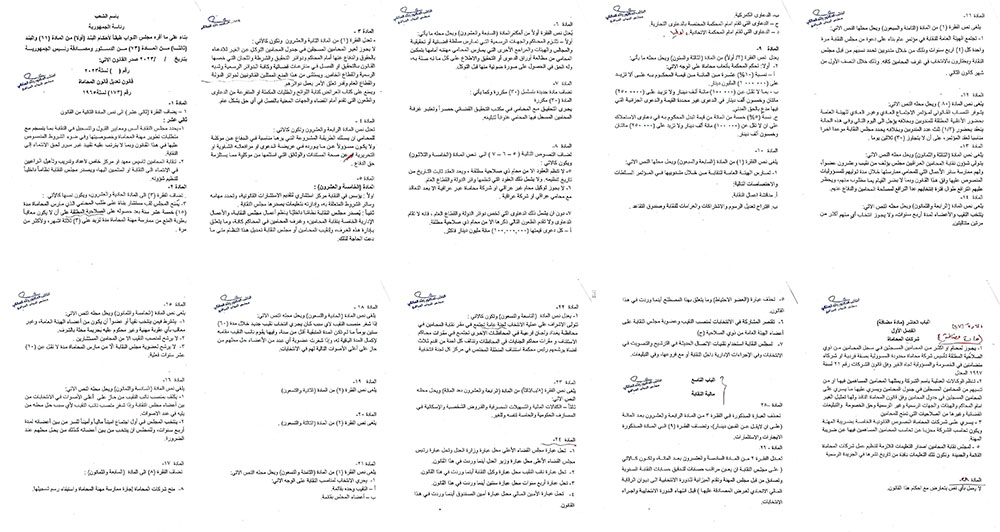 Proposed draft of Iraq’s Legal Profession Law addressing the immunity and protection of lawyers (Source: Iraqi Bar Association)
Proposed draft of Iraq’s Legal Profession Law addressing the immunity and protection of lawyers (Source: Iraqi Bar Association)
Articles in Iraq's Legal Profession Law.
Al-Taie mentions that the association has held a series of meetings with members of parliament to discuss proposed amendments to the law. Progress appears positive, as the Iraqi parliament held the first reading of the proposed amendment to Law No. 173 of 1965 during its 11th session on February 27, 2024. The proposal includes 28 articles.
Iraqi Bar Association secretary Ahmed al-Zaidi estimates that, on average, four to five lawyers are killed annually. The rates and frequency of physical and verbal assaults vary depending on the social environment in each province. But what makes practicing law so dangerous in Iraq?
A statement from the Media Department of the Iraqi Parliament announced that, during a session partially presided over by Deputy Speaker Shakhawan Abdulla, the Parliament completed the first reading of a proposed amendment to the law, submitted by the Legal and Labor Committees with the support of civil society organizations. The amendment aims to keep pace with developments and address the changes that have taken place in society and in the legal profession. It also seeks to enhance the activities of the Bar Association by establishing clearer and more precise regulations for those in the profession. Additionally, it includes the establishment of a "law institute" to improve lawyers' competence, strengthen their legal knowledge, develop their skills, and prepare lawyers capable of meeting the demands of the profession.
The statement also mentions that the amendment is intended to "increase the immunity of lawyers while performing their duties" and to address inconsistencies in the law. It also introduces new provisions related to law firms and legal chambers.
However, a legal team consulted by the investigation’s authors noted a significant discrepancy between the proposed draft of the law and the version read in parliament, particularly concerning provisions on "the protection of lawyers from assaults and the investigation procedures involving them."
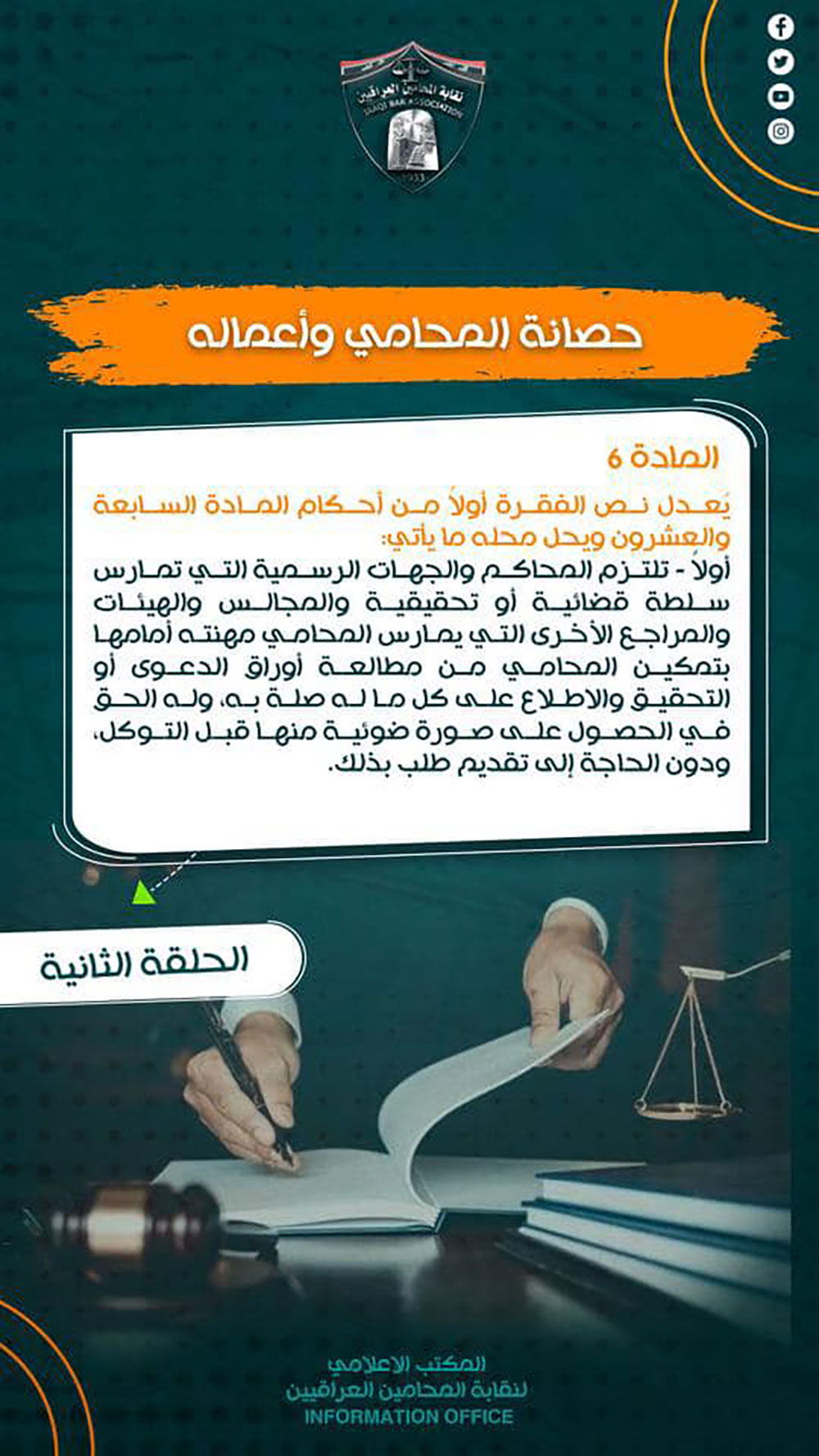 Proposed draft of Iraq’s Legal Profession Law addressing the immunity and protection of lawyers (Source: Iraqi Bar Association)
Proposed draft of Iraq’s Legal Profession Law addressing the immunity and protection of lawyers (Source: Iraqi Bar Association)
Proposed draft of Iraq’s Legal Profession Law submitted by the Iraqi Bar Association addressing the immunity and protection of lawyers (Source: Iraqi Bar Association)
The version of the law read in Parliament omitted certain articles that were included in the draft submitted by the Iraqi Bar Association. Among these were:
- Article 7, Section 1: "Anyone who assaults a lawyer while performing their duties or because of their work shall be punished with imprisonment for no less than seven years, without prejudice to any harsher penalties prescribed by law."
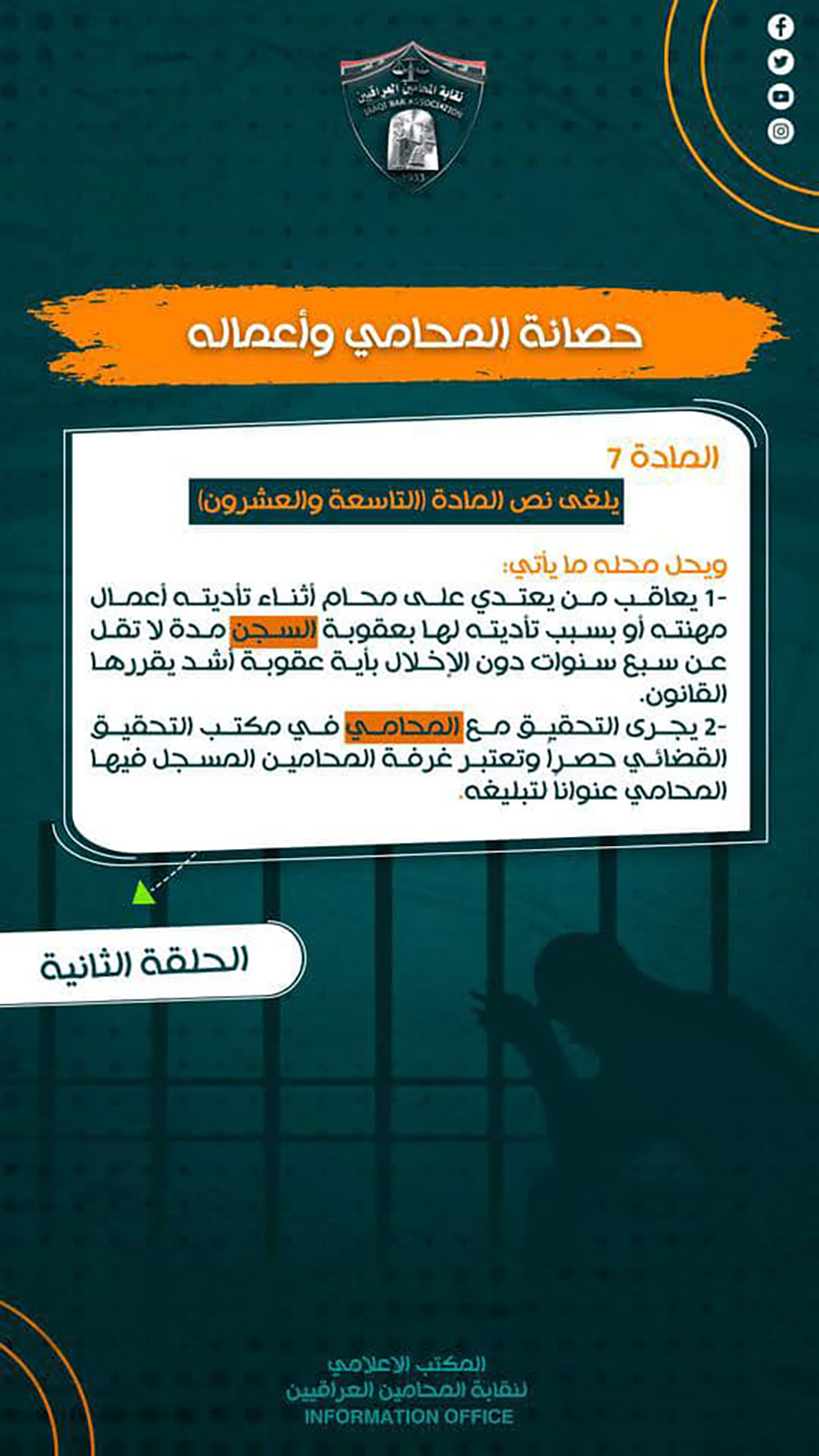 Proposed draft of Iraq’s Legal Profession Law addressing the immunity and protection of lawyers (Source: Iraqi Bar Association)
Proposed draft of Iraq’s Legal Profession Law addressing the immunity and protection of lawyers (Source: Iraqi Bar Association)
Proposed draft of Iraq’s Legal Profession Law submitted by the Iraqi Bar Association addressing the immunity and protection of lawyers (Source: Iraqi Bar Association)
- Article 8: "The Bar Association must be notified of any complaint filed against a lawyer. In cases of flagrant offenses, the investigation may proceed, but the lawyer cannot be questioned, investigated, or detained for a crime related to their professional duties without the approval of the Bar Association’s president or council. The president or their delegate must be present during the questioning and investigation."
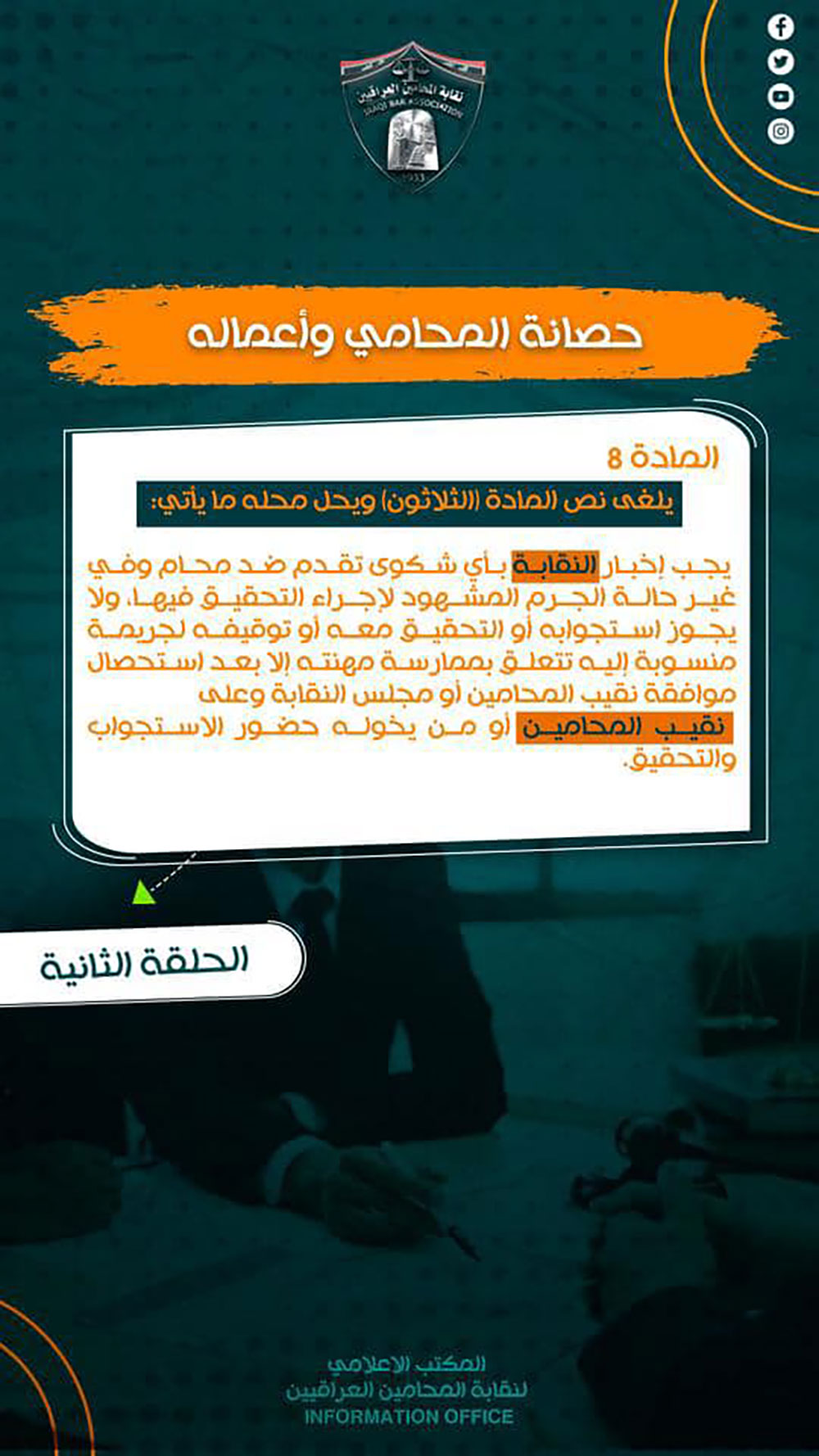 Proposed draft of Iraq’s Legal Profession Law addressing the immunity and protection of lawyers (Source: Iraqi Bar Association)
Proposed draft of Iraq’s Legal Profession Law addressing the immunity and protection of lawyers (Source: Iraqi Bar Association)
Proposed draft of Iraq’s Legal Profession Law submitted by the Iraqi Bar Association addressing the immunity and protection of lawyers (Source: Iraqi Bar Association)
The version read in Parliament, however, retained Section 2 of Article 7, which states: "The investigation of a lawyer shall be conducted exclusively at the Judicial Investigation Office, and the lawyer’s registered chamber shall be considered their official address for notifications."
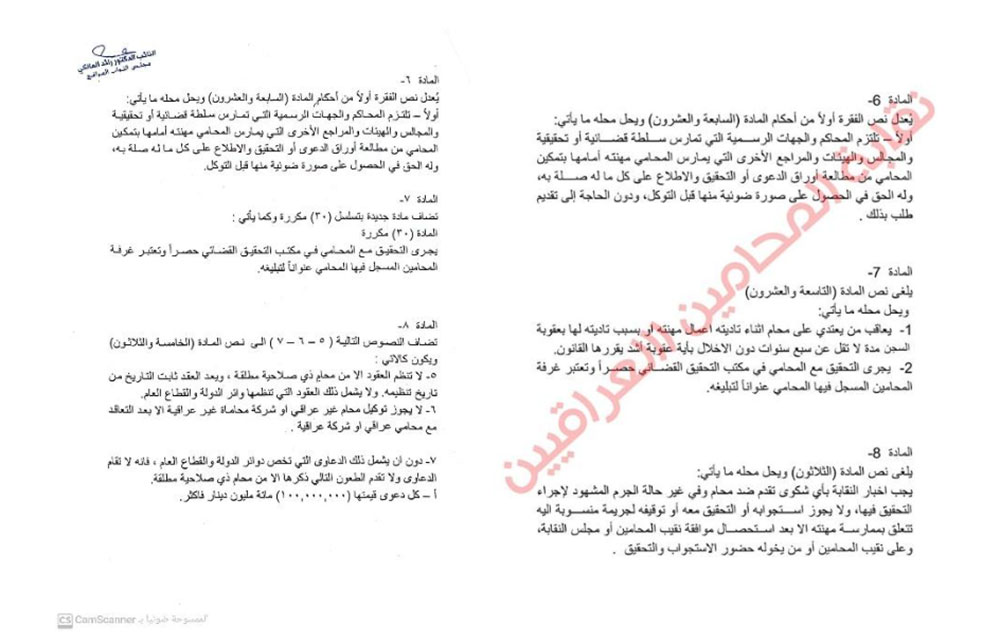 Proposed draft of Iraq’s Legal Profession Law addressing the immunity and protection of lawyers (Source: Iraqi Bar Association)
Proposed draft of Iraq’s Legal Profession Law addressing the immunity and protection of lawyers (Source: Iraqi Bar Association)
Proposed draft of Iraq’s Legal Profession Law addressing the immunity and protection of lawyers (Source: Iraqi Bar Association)
Despite these differences, the head of the Iraqi Bar Association, Ahlam Al-Lami, described the first reading of the law as "the first step towards a goal that we have all been striving to achieve for years. It is a significant milestone in the history of our association and for our fellow lawyers."
Al-Lami expressed hope that efforts would continue to ensure the “amendment is passed and voted on as soon as possible, marking a new era for the legal profession.”
Commenting on the discrepancies between the two versions of the law, Dr. Raed Hamdan al-Maliki, a member of the Parliamentary Legal Committee, stated during a press conference held in Parliament that the committee removed some of the provisions from the draft submitted by the Iraqi Bar Association to "reduce objections to the first reading." He noted that "not all the amendments proposed by the Bar Association were included."
Dozens of lawyers in Iraq say that tribal and clan traditions have become the most common means of resolving disputes as the state's ability to enforce laws and assert its authority declines. Tribal weapons now dictate outcomes, and violent tribal customs and councils have the final say.
Dr. Raed Hamdan al-Maliki, a member of the Iraqi Parliamentary Legal Committee, speaks at a press conference
Al-Maliki also emphasized that the Parliament will soon begin accepting feedback and suggestions on the law from its members, the Bar Association, and lawyers in general. All substantive and formal comments, including on the law's phrasing, will be discussed before the second reading and voting.
Al-Maliki pointed out that there have been several previous attempts to amend the current law, but none have progressed to the legislative stage as they have now. "We made significant efforts to convince political blocs, committees, and the parliamentary leadership of the importance of proceeding with the proposed amendments," he added.
Lawyer Ali Ihsan highlighted that the proposed amendments are all crucial and will restore some of the profession’s former stature. This includes addressing issues such as the competition faced by lawyers from intermediaries, brokers, and petition writers. The amendments clarify that lawyers are not responsible for the authenticity of documents received from clients. They also secure lawyers' access to investigation documents and other files. Additionally, the amendments define fee percentages in lawsuits and contracts handled by lawyers, as well as their fees when serving as advisors to companies.
He stresses the importance of the Iraqi Bar Association pressuring Parliament to ensure that provisions safeguarding lawyers from assault are included, or at least that the old law’s provisions, such as Article 29, are retained. Article 29 states that "anyone who assaults a lawyer while performing their duties, or because of their work, shall be punished with the same penalty as someone who assaults a public employee while performing their duties or because of their work."
Typically, an assault on a lawyer is often settled through side agreements without addressing the core issue or bringing the perpetrators to justice. This is because the perpetrators are usually backed by political parties, armed groups, or tribal entities, leading to the issue being quietly resolved. As lawyer Talal Ghanem notes, "This is the biggest problem—most, if not all, of the offenders go unpunished, which paves the way for more crimes."
However, Ghanem fears that the proposed amendment may never be read again, as has happened with many other laws, such as the Child Protection and Family Protection laws, due to the reluctance of influential parties to grant legal protection to lawyers. "Lawyers are known as the standing judiciary, and granting them protection and its guarantees would greatly harm the corrupt, who fill both official and unofficial governmental institutions."
On July 23, 2024, the Parliamentary Legal Committee held a meeting to discuss several proposed laws referred to it, including the proposal to amend the Advocacy Law No. 173 of 1965, with the intention of presenting it for a second reading in Parliament.
The threat of uncontrolled weapons
Dr. Kasim Turki AlJanabi, a professor at Al Rasheed University College in Baghdad, points out that Article 229 of the Iraqi Penal Code No. 111 of 1969 prescribes imprisonment for up to five years for anyone who insults or threatens a public official or someone performing a public service while they are carrying out their duties or because of them.
In an article published in the Encyclopedia of Cassation Decisions, he mentions that the same article also punishes anyone who insults or threatens certain professionals whose protection is guaranteed by specific laws. For instance, assaulting a doctor, whether in a hospital or their private clinic, is punishable under Article 32, Section 3a of the Iraqi Medical Association Law No. 81 of 1984. Similarly, assaulting a lawyer, whether in court or in their private office, is punishable under Article 29 of the law No. 173 of 1965. Assaulting a journalist while performing their duties or because of them is also subject to punishment.
AlJanabi clarifies that cases involving these crimes are initiated without the need for a formal complaint, as they are considered "a public right crime." This means that legal proceedings are initiated against the accused even if the complainant does not file a complaint. Reconciliation or waiving charges is not allowed in such cases, as they are not among the crimes that require a complaint from the victim to proceed, as stipulated in Article 3 of the Code of Criminal Procedure. Additionally, pardon of the convicted person is not accepted in this case.
Given this, legal experts argue that Iraqi legislators already provide protection for lawyers without the need for special laws or specific provisions. However, others insist on such protections, particularly given the prevalence of what is known in the country as "uncontrolled weapons," which have led to increased assaults on various segments of society.
Since the US invasion of Iraq in 2003, the country has witnessed severe security deterioration, according to politicians, human rights activists, and civil society members. The activities of armed groups have intensified, and what is officially described as "uncontrolled" weapons have become rampant. This reality threatens the legal profession, exposing many lawyers to the risk of assassination, repeated assaults, and various forms of extortion.
Iraqi Bar Association secretary Ahmed al-Zaidi estimates that, on average, four to five lawyers are killed annually. The rates and frequency of physical and verbal assaults vary depending on the social environment in each province.
He notes that the public’s ignorance about the role of lawyers is the primary cause of the assaults against them, explaining that lawyers work in a dangerous environment. "Society is plagued by chaos, the proliferation of weapons, and tribalism. Simply filing a lawsuit on behalf of a client, such as for child custody or alimony, can result in the lawyer facing numerous obstacles, including threats and warnings via strange phone numbers, tribal authority, or defamation on fake social media accounts."
Al-Zaidi holds Parliament responsible for the challenges lawyers face, because it has not enacted a strong, deterrent law that provides protection. He warns that assaults will likely increase if the situation remains unchanged, as the existing law is outdated and no longer adequate.
He adds, "We need help from civil society and human rights organizations to educate certain segments of the public about the role of lawyers, starting with government employees. Some of them see lawyers as competitors in their work and openly express their disdain for the profession. Many employees and department heads obstruct cases and procedures handled by lawyers."
Regarding the Bar Association's role when a lawyer is assaulted, al-Zaidi says, "The Bar Association is involved in any case where a lawyer is one of the parties. It contributes to the legal process on its own by sending a legal representative, and it never forfeits a lawyer’s rights unless their position is weak or it is proven that the assault was personal and unrelated to their professional duties."
Constant threats and assaults
Lawyer Nawzad Ali, who has faced threats and pressures that forced him to abandon several cases, says the legal profession faces significant challenges in Iraqi society due to the multiple groups wielding authority and operating outside the state’s legal framework.
Lawyer Mohamed Ahmed recalls that before 2014, armed groups like al-Qaeda, and later ISIS, routinely threatened and extorted lawyers. The same situation persisted after 2017, "Even police stations avoid accepting complaints or handling them according to legal procedures because the power of certain groups surpasses that of the legal security authorities.”
"There is the authority of armed groups. Whether they support the state or oppose it, they can kill anyone in broad daylight—and lawyers make ideal targets if they stand in their way. Then there’s the tribal and clam authority, which imposes its customs, also by force of arms, and finally the political parties and their affiliates, who wield significant influence," Ali explains. He adds that any of these forces can intimidate a lawyer, either through physical assault or verbal threats, due to their involvement in a case. "Personally, I’ve had to abandon numerous cases because of threats from my clients’ opponents."
Similarly, lawyer Mohamed Ahmed from Nineveh recounts how he faced harassment from security forces both before and after ISIS took control of Mosul, the capital of Nineveh province, in June 2014, and then after its liberation in the summer of 2017.
Ahmed was involved twice in cases defending individuals accused of belonging to armed groups. "In both instances, I received threats from security officers—one of whom accused me of being affiliated with ISIS, despite the fact that I’m just a lawyer doing my job as guaranteed by the law. I was also personally affected by ISIS and its terror; I was displaced from the city for more than three years and lost several relatives and friends who were killed by the terrorist group," he says.
Ahmed recalls that before 2014, armed groups like al-Qaeda, and later ISIS, routinely threatened and extorted lawyers. The same situation persisted after 2017, with gangs extorting some lawyers under the pretext of their affiliation with Popular Mobilization Forces militias. "Even police stations avoid accepting complaints or handling them according to legal procedures because the power of certain groups surpasses that of the legal security authorities," he says.
Lawyers in Baghdad have told the investigators of this report that their profession has become increasingly dangerous, even in cases unrelated to security, such as those involving social disputes and financial or commercial conflicts. The work has become fraught with dear and concern, as it is impossible to predict who might threaten a lawyer.
Ahmed Salem, a lawyer specializing in civil cases, describes the situation as disastrous. "No one can stand against all these powers operating outside the law," he says. When asked what the Iraqi Bar Association can do about it, he answers, "Nothing." He then adds, "All the leaders and officials of successive governments are aware of this and remain silent, which only deepens the problem."
In late 2022, lawyer Du’a al-Taie appeared on media outlets to reveal the incidents of assault she faced at the Residency Directorate in Baghdad by a colonel in the Foreign Nationals Residency Department. She reported that she and many of her female colleagues had previously been subjected to harassment and intimidation while practicing their profession. In response, the Minister of Interior, Abdul Amir al-Shammari, ordered an investigation into the incident, including reviewing surveillance footage and interviewing witnesses.
Despite the judicial order issued at the time to summon the officer under Article 230 of the Iraqi Penal Code and the formal request sent to his superiors, the Iraqi Bar Association decided to close lawyers' offices in all internal security courts and suspend all assignments, directing lawyers to refrain from representing cases there as a protest against the incident.
The head of the Bar Association, al-Lami, stated that this protest was not just about the assault on lawyer Du’a al-Taie but was a message to everyone that "the Bar Association and its members will not remain silent on any violation of their rights."
The association issued a statement condemning the attack, expressing astonishment that an Iraqi lawyer was assaulted after visiting the General Residency Directorate. The statement criticized how “the attacker then portrayed her as the accused, placing her in the position of a suspect and detainee by fabricating evidence, a tactic familiar to some who use it to protect their crimes. We will not remain silent about this, nor will we let it pass without consequence."
Ahmed Salem, a lawyer specializing in civil cases, describes the situation as disastrous. "No one can stand against all these powers operating outside the law," he says. "All the leaders and officials of successive governments are aware of this and remain silent, which only deepens the problem."
However, despite the association's stance, the reality on the ground reveals its inability to take meaningful action to stop the repeated violations and assaults carried out by powerful entities within or outside state institutions.
In April 2023, social media and news outlets were abuzz with the case of lawyer Haneen al-Taie, who sustained injuries after being stabbed in the Jihad neighborhood in western Baghdad due to a lawsuit she was handling.
The lawyer recounted that her assailant, who belonged to an armed group, later stole her phone, transferred her SIM card to another device, deleted the pleas she had made regarding the attack, and threatened to publish her photos stored on the Snapchat app.
She added that the assailant had previously sent six people to her home, where they assaulted a worker she employed. She called on judicial authorities for help, as she no longer felt safe for her or her family's lives.
Lawyer Haneen al-Taie describes the assault on her.
Typically, after a few days or weeks following a blatant assault on a lawyer that gains attention, the matter is often settled through side agreements without addressing the core issue or bringing the perpetrators to justice. This is because the perpetrators are usually backed by political parties, armed groups, or tribal entities, leading to the issue being quietly resolved. As lawyer Talal Ghanem notes, "This is the biggest problem—most, if not all, of the offenders go unpunished, which paves the way for more crimes."
A demonstration against attacks on lawyers in Iraq.
Lawyers bearing arms
Iraqi Bar Association secretary al-Zaidi mentioned that the Ministry of Interior has allowed lawyers to carry weapons for several years. "Obtaining the permit is easy, and the process is facilitated through the association," he said. However, he added, "While arming lawyers is a temporary fix, some see it as necessary. After experiencing a home invasion or attack, a lawyer might feel compelled to carry a weapon for self-defense."
In this context, Judge Salem Roudhan noted that the right for lawyers to carry firearms is guaranteed under Article (6) of the Weapons Law No. 51 of 2017, which allows any citizen—not just lawyers—to apply for a permit to possess and carry a firearm, provided certain conditions are met.
He argued that enacting a special law to permit lawyers to carry weapons would be ineffective in protecting them from attacks if there are no "effective and real forces to enforce the law and ensure protection for all."
According to Roudhan, lawyers have "noble and honorable" duties related to defending rights and freedoms "through argument, evidence, and enlightened thought, rather than with weapons." Therefore, he believes that passing additional legislation for carrying arms "would only contribute to putting weapons in the hands of individuals rather than the relevant authorities."
Judge Roudhan also pointed out that Iraq’s legislative framework does not include a specific "law to protect lawyers," unlike the protection law for doctors. However, the Penal Code No. 111 of 1969 and the legal profession law do provide legal protections for the profession, including provisions that safeguard a lawyer’s rights and life while performing their duties.
Roudhan believes that the existing legal provisions are sufficient to protect both lawyers and non-lawyers, provided the authorities and agencies responsible for citizen protection are activated. These agencies include the security forces tasked with ensuring personal and collective security for everyone living in Iraq, as stipulated in Article (1) of the Police Duties Law No. 176 of 1980.
Lawyers in Baghdad have told the investigators of this report that their profession has become increasingly dangerous, even in cases unrelated to security, such as those involving social disputes and financial or commercial conflicts. The work has become fraught with dear and concern, as it is impossible to predict who might threaten a lawyer.
Suhaib B., a seasoned lawyer from Anbar, has practiced law for nearly 30 years. However, following an incident related to his work, he was forced to leave the country and has been living in Istanbul, Turkey, since 2018.
He shared his story with Raseef22, "I am from a village in Saqlawiya, Anbar, and I am known there for helping people. One day, a woman came to my house complaining that her son had thrown her out of her home. She said he had deceived her into signing a waiver for the house, which was registered in her name, and she wanted me to help her get it back."
He continued, "The next day, I was waiting for her to arrive so we could go to the notary public to sign a power of attorney. When there was a knock on the door, I opened it to find several angry men wielding knives and clubs standing outside. They attacked me in front of my wife and daughters. I was injured, and my wife developed diabetes from the shock of the incident."
After the attack, Suhaib was forced to carry a gun wherever he went, as he received death threats if he pursued a complaint against his attackers. He could no longer return to his practice, as his family feared that every case might lead to a similar fate.
Unable to withstand his family’s insistence on leaving the country, Suhaib sold his home and all his properties and migrated with his family to Turkey, never to return.
Similarly, dozens of other lawyers in Iraq have abandoned their profession for other trades out of fear of retribution and attacks from powerful entities within a state weakened by poor law enforcement by its executive agencies.
*The investigation was conducted under the supervision of the Iraqi Network for Investigative Journalism (NIRIJ) and CFI.
* The ‘degga’ tribal custom involves shooting (or “knocking”) at someone's house. It is a way used by clans to warn people or get them to the negotiating table.
Raseef22 is a not for profit entity. Our focus is on quality journalism. Every contribution to the NasRaseef membership goes directly towards journalism production. We stand independent, not accepting corporate sponsorships, sponsored content or political funding.
Support our mission to keep Raseef22 available to all readers by clicking here!
Interested in writing with us? Check our pitch process here!
